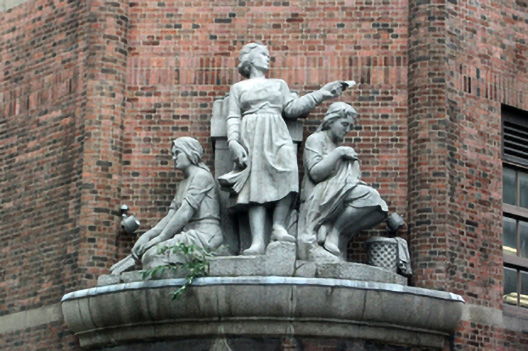Brief History 1941 - 2023
Since its first inception as St Mary's College of Domestic Science in June 1941, the School of Culinary Arts and Food Technology has evolved and developed with societal, political and economic changes nationally and internationally. Our school now stands as a centre of excellence in education within the Food, Drink and Horticulture sectors where we are the leading provider of education, training and research for the culinary, horticulture and food-related industries in Ireland.

Three Graces sculpture by Gabriel Hayes on the west corner of the former College of Catering.
Photograph: Technological University Dublin
On 16 June 1941 St. Mary’s College of Domestic Science, Cathal Brugha Street, Dublin 1, opens its doors to its first students. The beginning of what became DIT Cathal Brugha Street and a long tradition of nurturing excellence in generations of Irish students in all aspects of food, beverage and hospitality.
Some of the first courses offered were ‘art, needlework, laundry, dressmaking and dress design, housewifery, cooking (including institutional and hotel work), the training of chefs and waitresses, applied science, domestic housekeeping and physical culture’.
The college’s prospectus referred to its ‘national importance’ because the new institution would be ‘responsible for the work of training teachers of Domestic Economy which was formerly carried out at St Kevin’s Park, Kilmacud, Co. Dublin’. Kathleen O’Sullivan was appointed first principal and served until 1950, when she was succeeded by Winifred Bouchier-Hayes.
Institutional & Hotel Cookery and a postgraduate course in Dietetics is added to the curriculum.
Domestic Science Training is relocated to St. Angela’s in Sligo. The college expands its provision of courses for the Hotel Catering and Tourist Industries at both national and international level. By 1954 a three-year hotel management certificate course was available.
In the early 1960s the certificate course was converted to a three-year diploma course with the first graduates emerging in 1965.
By 1968 there was a range of full-time courses in areas such as hotel reception, accommodation management, and apprentice waiters. Part-time courses were available for working chefs and waiters.
In 1973 a four-year Higher Diploma in Hotel and Catering Management course commenced and was granted degree status by Dublin University in 1977.
In 1977 City & Guilds advanced master chef courses in both kitchen and larder, and in pastry. Graduates from these programmes became teachers, entrepreneurs and leaders in the culinary, hospitality and restaurant industry.
Graduate Kevin Thornton was the first Irish Chef to be awarded two Michelin stars in 2001.
